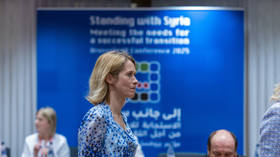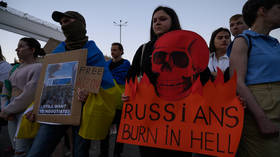“Mass Immigration will be the Death of Europe"
 Hungarian PM Viktor Orbán:
“Mass Immigration will be the Death of Europe, so we have to stop it. But the first target is Peace. The whole language and culture of the European Union is pro-War. I don’t like it.”
Fact check: TRUE
Hungarian PM Viktor Orbán:
“Mass Immigration will be the Death of Europe, so we have to stop it. But the first target is Peace. The whole language and culture of the European Union is pro-War. I don’t like it.”
Fact check: TRUE 
Eva Vlaar unloads on the EU's Ursula von der Leyen
https://x.com/i/status/1902070644080308295
EU’s Kallas has alienated major member states – FAZ

EU foreign policy chief Kaja Kallas is facing mounting resistance in key Western European capitals over her ambitious military aid plan for Ukraine, according to an analysis published on Monday in the Frankfurter Allgemeine Zeitung (FAZ) newspaper. France, Italy, Spain, and Portugal are now joining Hungary in opposing significant new contributions, according to the outlet.
Kallas, who took office in December, has struggled to win over skeptical governments. Her proposal to raise EU military support for Ukraine to €40 billion this year – aimed at offsetting dwindling US aid – has met stiff resistance, the newspaper’s political correspondent Thomas Gutschker wrote. Many member states have refused to commit beyond the €15 billion already pledged, with Berlin’s planned €3 billion contribution still awaiting approval. So far, Denmark alone has given more than France, Italy, and Spain combined.
According to the FAZ, Kallas’ efforts to push through the funding have been hampered by political missteps. The paper cited unnamed diplomats as arguing she failed to properly consult key EU nations before reviving the proposal, which was originally introduced by her predecessor, Josep Borrell. Her decision to remove high-ranking officials from Italy and Spain from the European External Action Service has also sparked backlash, with some EU governments reportedly “furious,” the FAZ reported.
Beyond military aid, Kallas has also weakened her standing in Washington. The article noted that her criticism of President Donald Trump’s Ukraine strategy – dismissing it as a “dirty deal” – led to US Secretary of State Marco Rubio canceling a scheduled meeting with her during her February visit. No senior US officials met with her during the trip, highlighting her diplomatic isolation. Meanwhile, EU leaders are pushing to be involved in US-Russia-Ukraine peace negotiations, fearing they are being sidelined.
Internally, Kallas’ handling of Ukraine policy has drawn sharp criticism from Berlin, the newspaper added. German officials were angered when on her first day in office she declared, “The European Union wants Ukraine to win this war.” While Eastern European nations share this view, Berlin has stuck to its more cautious official line of supporting Kiev “as long as necessary” without committing to victory as a stated goal.
Ukraine can't possibly win the war, the real choice is - does Europe want to lose along with Ukraine considering Ukraine is an uber-corrupt country that is neither part of the EU, nor NATO.
Additionally, her move to explore confiscating frozen Russian assets in the EU has faltered. Although backed by the Baltic states, the proposal has encountered fierce resistance from Eurozone heavyweights, while the European Central Bank has warned of major financial risks if it is implemented. Faced with legal obstacles, Kallas has now reportedly quietly shelved the initiative.
As EU leaders prepare to discuss her plan again later this week, the FAZ suggested her political survival hinges on securing greater backing from French President Emmanuel Macron and Italian Prime Minister Giorgia Meloni. However, expectations are low and insiders are cautioning that significant new commitments are unlikely.
The FAZ concluded that Kallas’ position remains precarious, as she struggles to balance EU unity with her own hardline stance on Russia.
==============================================================================================
German MPs approve fiscal 'bazooka' for defence, infrastructure
VVD calls for boosting Dutch defense spending to at least 3.5 percent of GDP
The Netherlands must significantly increase its defense budget, raising spending to at least 3.5 percent of gross domestic product (GDP), according to the VVD. Party leader Dilan Yesilgöz made the call during a meeting with party members at the Oorlogsmuseum (War Museum) in Overloon, citing the need to counter Russian threats and provide stronger support for Ukraine, NOS reports.
The proposal goes well beyond the current NATO guideline of 2 percent of GDP, which the Schoof Cabinet has committed to meeting. If implemented, the increase would add more than 15 billion euros to the annual defense budget.
Yesilgöz emphasized the urgency of expanding military spending in response to global security concerns. “To stand up for our safety, to confront the Russian threat, and to support Ukraine decisively, we must scale up our defense budget to at least 3.5 percent of GDP—possibly even higher,” she said. The backdrop of her speech at the War Museum included a World War II-era military plane and a jeep.
Is she stupid, or a Deep State stooge?
She also urged the Dutch government to press other European nations that are failing to meet the NATO standard of 2 percent. “Countries like Spain, Italy, and Luxembourg lag far behind. That is unacceptable,” Yesilgöz stated.
Her remarks align with recent statements by NATO Secretary General Mark Rutte, who argued that member states should invest between 3.6 and 3.7 percent of GDP to meet future alliance objectives. Former U.S. President Donald Trump has gone even further, suggesting NATO allies should spend 5 percent, though the United States itself has not yet reached that level.
The VVD’s proposal faces resistance from coalition partners PVV, NSC, and BBB, who have expressed skepticism about increasing defense spending beyond the agreed 2 percent. The PVV, the largest governing party, insists that any discussion of higher military funding must be paired with financial relief for Dutch households. “It’s both or neither,” PVV leader Geert Wilders warned in the Tweede Kamer last month. On social media, he reinforced his stance, stating that additional defense spending is negotiable only if there are significant cuts to climate policies and other VVD priorities.
NSC and BBB have also voiced concerns, arguing that billions in additional defense spending are difficult to justify while the country faces pressing economic challenges, including rising living costs and financial security issues.





No comments:
Post a Comment